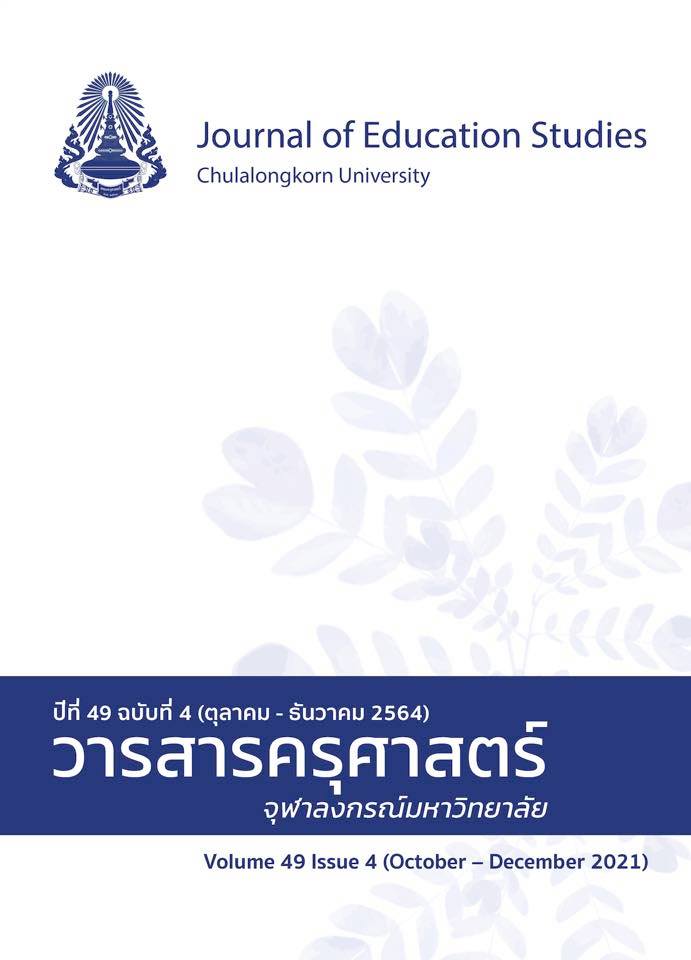The Development of English Speaking Skills using a Task-based Learning Approach Focused on Selling Local Products for the Ninth Grade Students
DOI:
https://doi.org/10.14456/educu.2021.72Keywords:
speaking skills, task-based learning, local productsAbstract
The purposes of this pre-experimental research were: 1) to compare students’ average speaking skills scores before and after using a task-based learning approach focused on selling local products and 2) to study the students’ satisfaction and attitude towards the task-based learning approach. Selected by purposive sampling, the samples consisted of 35 ninth graders from the school under the secondary education service area office Phetchaburi in the second semester of the 2019 academic year. The research instruments included 1) a direct speaking skills test, 2) a student satisfaction questionnaire, and 3) a semi-structured interview form. The data were analyzed by using mean, standard deviation, t-test dependent scores, and content analysis. The study found that, after using a task-based learning approach, the students’ average English-speaking skill scores were higher at the .05 level of significance, with student satisfaction at the highest level. Students also showed a positive attitude towards the use of this approach because they felt that they were able to apply what they learned from the task-based session to a real-life conversation.
References
กมลวรรณ โดมศรีฟ้า. (2551). การศึกษาการใช้กิจกรรมการพูดเพื่อการสื่อสารในการพัฒนาความสามารถด้านการพูดภาษาอังกฤษของนักเรียนชั้นมัธยมศึกษาปีที่ 1 [สารนิพนธ์ปริญญามหาบัณฑิต]. สำนักหอสมุดกลาง มหาวิทยาลัยศรีนครินทรวิโรฒ. http://thesis.swu.ac.th/swuthesis/Tea_Eng_For_Lan(M.A.)/Kamonwan_D.pdf
กระทรวงศึกษาธิการ. (2551). หลักสูตรแกนกลางการศึกษาขั้นพื้นฐาน พุทธศักราช 2551. ชุมนุมสหกรณ์การเกษตรแห่งประเทศไทย.
กระทรวงศึกษาธิการ. (2558). แนวทางการจัดทักษะการเรียนรู้ในศตวรรษที่ 21 ที่เน้นสมรรถนะทางสาขาวิชาชีพ. ชุมนุมสหกรณ์การเกษตรแห่งประเทศไทย.
กระทรวงศึกษาธิการ. (2560ก). การขับเคลื่อนการศึกษามัธยมศึกษาไทย 4.0 เพื่อการมีงานทำแห่งศตวรรษที่ 21. ชุมนุมสหกรณ์การเกษตรแห่งประเทศไทย.
กระทรวงศึกษาธิการ. (2560ข). แผนการศึกษาแห่งชาติ พ.ศ. 2560–2579. สำนักงานเลขาธิการสภาการศึกษา.
คมชัดลึก. (2560, 16 มีนาคม). คิด(โซน)ของวัยทีน : เรียนอังกฤษแต่เด็กทำไมพูดไม่ได้. คมชัดลึก. https://www.komchadluek.net/news/edu-health/265267
จารึก อะยะวงศ์. (2556, 20 กุมภาพันธ์). เด็กไทยอ่อนภาษาอังกฤษ ผิดที่หลักสูตร. ศูนย์รวมเว็บไซต์โรงเรียนในประเทศไทย. http://www.educationnews.in.th/25502.html
พีรพัฒน์ ยางกลาง. (2556). กริยาวลีในภาษอังกฤษ. วารสารอักษรศาสตร์ มหาวิทยาลัยศิลปากร, 35(1), 142-160.
หริศักดิ์ พลตรี. (2558). ผลการใช้บทเรียนภาษาอังกฤษที่เน้นภาระงานและสาระท้องถิ่นต่อความสามารถการฟัง-พูดภาษาอังกฤษของนักเรียนชั้นมัธยมศึกษาปีที่ 1 โรงเรียนน้ำเกลี้ยงวิทยา [วิทยานิพนธ์ปริญญามหาบัณฑิต]. มหาวิทยาลัยศิลปากร. http://ithesis-ir.su.ac.th/dspace/handle/123456789/968
ภาษาอังกฤษ
Albino, G. (2017). Improving speaking fluency in a task-based language teaching approach: The case of EFL learners at PUNIV-Cazenga. SAGE Open, 7(2) 1-11.
Bartz, H. (1979). Testing oral communication in the foreign language classroom. Center for Applied Linguistics.
Byrne, D. (1991). Teaching oral English. Longman Group.
Canale, M. & Swain, M. (1980). Theoretical bases of communicative approaches to second language teaching and testing. Applied Linguistics, 1(1), 1-47.
Ekler, T., & Cinkara, E. (2018). The impact of the topic familiarity on EFL students’ speaking scores. Gaziantep University, 2(2), 45-58.
Ellis, R. (2003). Task-based language learning and teaching. Oxford University Press.
Ghasemi, A. A., & Mozaheb, M. A. (2021). Developing EFL Learners' speaking fluency: Use of
practical techniques. MEXTESOL Journal, 45(3), 1-13
Gilakjani, A. P., & Ahmadi, S. M. (2011). The Effect of text familiarity on Iranian EFL learners'
listening comprehension. Journal of Language Teaching and Research, 2(4), 783-789
Harmer, J. (2007). How to teach English. Pearson Education Limited.
Heaton, J. B. (1990). Writing English language tests. Longman Group UK.
Kazemi, S. A., & Zarei, L. (2015). The efficacy of topic familiarity on oral presentation: Extensive speaking assessment task of Iranian EFL learners in TBLT. International Journal of Applied Linguistics and English Literature, 4(3), 93-97.
Littlewood, W. (1981). Communicative language teaching. Cambridge University Press.
Munirah, M., & Muhsin, M., A. (2015). Using task-based approach in improving the students’ speaking accuracy and fluency. Journal of Education and Human Development, 4(3), 181-190.
Nunan, D. (2004). Task-based language teaching. Cambridge University Press.
Porkaew, K. (2004). The roles of attitude and motivation in second and foreign language learning. Thammasat University Language Institute Journal, 69(1), 69-76.
Prabhu, N. (1987). Second language pedagogy. Oxford University Press.
Qiu, X. (2019). Functions of oral monologic tasks: Effects of topic familiarity on L2 speaking
performance. SAGE Journals, 24(6), 745-764.
Schmidt-Rinehart, B. C. (1994). The Effects of topic familiarity on second language listening
comprehension. The Modern Language Journal. 78(2), 179-189.
Thompson, C., & Millington, N. (2012). Task-based learning for communication and grammar use. Language Education in Asia Journal, 3(2), 159-167.
Valette, R. M. (1977). Modern language testing (2nd ed.). Harcourt Brace Jovanovich.
Willis, J. (1996). A framework for task-based learning (3rd ed.). Addison Wesley Longman.
Downloads
Published
How to Cite
Issue
Section
License

This work is licensed under a Creative Commons Attribution-NonCommercial-NoDerivatives 4.0 International License.




